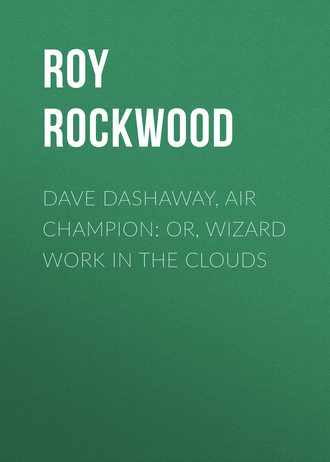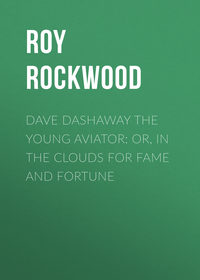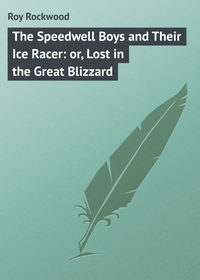 полная версия
полная версияDave Dashaway, Air Champion: or, Wizard Work in the Clouds
“Us?” repeated Hiram – “Oh, yes! You can be sure they’d ask you, though. What you going to do about it?”
“Oh, we’ll think it over. They write that they are sending the details, such as rules and restrictions, in a later mail. We’ll study them when they come.”
Of course Hiram, in his impetuous way, was ready to take up any proposition in the aviation line, no matter how important. To him Dave was the one champion in the field able to compete with all rivals. He had been with Dave long enough, however, to get used to his methodical business-like ways. Hiram was eager to plunge at once into the merits of the new proposition, but he knew that Dave had put the matter aside until he was ready to take it up for real action.
“Oh, say, Dave,” Hiram changed the subject, “come along till I show you the picture our tramp friend has drawn. That’s the man who tried to blow us up,” he announced, as they reached the side of the hangar where the sheet of manilla paper was tacked.
Dave surveyed the sketch critically. He saw at a glance that the artist had caught some strong facial characteristics of the person whose likeness he had attempted to draw. The young birdman shook his head slowly.
“Don’t know him?” broke in Hiram questioningly – “neither do I. Anybody would again, though, if that sketch looks like him. See here, Dave,” and Hiram was very serious and impressive, “it’s just such mean tricks as this one that have been the start of all kinds of trouble for us. We want to nip it in the bud this time. What do they say up at the office?”
“They promise a thorough investigation. There has been quite a lot of vandal work at the different meets, and they say they will spare no pains, or expense, to run down the fellows who are discrediting our exhibitions. Want to speak to me?” asked Dave in a kindly tone, noticing the tramp hovering about near them as if he had something on his mind.
“Why, yes,” answered Borden. “You fellows have been mighty good to me, and I feel as if I owed you something. I’m no detective, or anything of that sort, but if it’s a point to you to find out something about the original of that picture – ”
“I should say it was!” interrupted Hiram, strenuously.
“Then, as I’m the one who saw him closest, and who know him best, maybe I’d be luckiest in recognizing him on sight. I’ll take a little scurry around, if you say so, and try to run him down, or head him off, and find out what’s back all this.”
“Vernon, our old-time enemy is back of it, or else some envious chaps who think you may go to this new meet, and who want to keep you out of it because they know you’ll win,” whispered Hiram to Dave.
“That is a very good idea,” said the latter to Borden. “You think you saw this same man hanging around the grounds last evening? You might come across him again by keeping your eyes open. Suppose you do that now? Here’s a little change you may need,” and the young aviator slipped some silver coins into the man’s hand. “Hiram, the management here are talking about a bonus-flight the end of this week. I’m interested and have promised to meet with the directors in an hour. I suppose you want to take your regular fly with the Scout?”
“I’ve counted on it,” replied Hiram promptly, “but some one ought to keep a close watch around the hangar, I suppose.”
“Oh, I don’t think we’ll be troubled in the day time,” answered Dave. “You can arrange with the grounds watchman to look in on our property from time to time. You won’t be gone very long, I suppose?”
“Oh, just a scurry across country, and back,” replied Hiram, with a nonchalance manifestly affected, and Dave smiled to himself, suspecting that his young assistant was up to something as he recalled to his mind the mysterious bags that Hiram had been making.
Surely enough, those same bags played a part in the later proceedings of the ardent young amateur airman. The tramp had started off on his mission, promising to report his possible discoveries that same evening. Dave followed him in the direction of the office of the grounds. Hiram, left alone, bustled about in the most active enjoyment of one of those occasions when he was given a chance to test out the knowledge of air-sailing he had acquired under the tuition of his gifted chum. He threw open the doors of the hangar, and, as the bright sunlight streamed in, stood in a sort of rapt dream surveying the two machines exposed to his view.
“The beauties!” he cried, his sparkling eyes resting first upon the Ariel and then upon the Scout.
The Ariel was the very latest model in the aeroplane line. It succeeded the famous Comet. That was the fine machine in which Dave and his friends had made their trip around the world. The Comet had been built more for rough usage and staying power, than for fancy sprints or stunts. It was now an honored relic in the show rooms of the Interstate Aero Company. Only a few weeks before the present introduction of the reader to our young hero, Mr. Brackett had delighted his young protégé by shipping to him, at the Midlothian grounds, the latest model in air craft.
The Ariel flew as a parasol-type biplane. It gratified Dave to note that the manufacturer had followed out many incidental suggestions he, himself, had made from time to time, when visiting the plant which Mr. Brackett practically owned. The main planes of the new machine enabled easy entrance to, and exit from, the cockpit. The pilot had an unhampered view in all directions. The craft had a maximum span of thirty-five feet and a chord of seven feet.
The area of the main planes was two hundred and twenty-five square feet. The over-all length of the machine was twenty-five feet, while the weight empty, was nine hundred pounds. The motor was of radial construction and of the six-cylinder type, having a bore and stroke of five by six inches respectively. A speed of about eighty miles per hour was easily attained by the machine loaded with fifty gallons of gasoline and ten of lubricant, as an average for a three-hour flight.
“Want some help?” inquired a man from a neighboring hangar, strolling up to the spot.
“Just a mere lift,” replied Hiram briskly. “The little Scout acts just as anxious to get up cloud-chasing as I am.”
“Ready,” announced the helper, getting into position.
“Let her go,” ordered the enthusiastic young airman in a tone like a hurrah, his quivering fingers clutching wheel and control, and thrilling to the tips with animation and delight.
It was a superb day. Air, sky and wind currents were propitious for an easy flight. To Hiram there was nothing in the world equal to that delightful sensation of skimming through the air like a bird. It was almost rapture to realize that the turn of a wrist, or the pressure of his foot sent the airy, graceful fabric of steel and wood far aloft, like a pinion-poised eagle, ascending safely through space as would a speeding swallow arrow-aimed for a long, deep dive.
Hiram struck a course due west, once aloft at a convenient level. Eyes and mind were fixed upon a direct point in view. At the end of an hour he was out of sight of the camp and the air craft practicing in the vicinity of the exhibition grounds.
Between two settlements, some fifteen miles apart, Hiram began to descend. It was where a two mile reach of level pasture land intervened, dotted here and there with underbrush and stunted trees. The Scout landed and its young pilot alighted. Under one arm he carried some sheets of white paper. He halted to place one of these on the ground, holding it flat by stones weighing down its corners. He then proceeded fully half a mile farther, again placed a sheet on the ground, gradually, in like manner, making a circle of fully a mile and a half. Finally he came back to the Scout, and got up into the air again.
“Target practice!” chuckled Hiram, as he circled away from the spot, made a sharp turn and volplaned full speed, as though aiming to land, nose first, directly upon the first white sheet in his course. Hiram made a magnificent dive. He swung over the control so that fifty feet from the ground the machine turned the reverse arc of a circle of nearly two hundred feet. His hand shot down beside him and grasped one of the bags, lifted it, aimed it and practically fired it at the “target” in view.
“Missed,” he grimly observed, but quite pleased all the same, for the bag landed flat and did not roll, and lay not two feet away from its intended mark.
“Hit it!” crowed the excited Hiram as, with a second swoop, he made a direct hit of the second target with a second bag. The third was a miss. The fourth was like the second.
“If I can make it that good, what can’t Dave Dashaway do?” soliloquized the young aeronaut, as he gathered up the bags and replaced them in the Scout. “I’ll spring the scheme on him just as soon as he makes up his mind to go into that International contest, which he’s just got to do!”
Hiram went afloat once more, determined on a swift run west, a turn, and then a course homeward bound.
“Hum” he chuckled. “If any of the airmen saw my maneuvers with those bags they’d think I was practicing to go over to Europe and drop bombs. Now what does that mean?” murmured the lad suddenly, and, with a quick start, Hiram slackened his speed, to study out the details of a lively scene in progress directly beneath him.
CHAPTER IV
THE UNDER DOG
“I’m not going to stand that!” suddenly shouted Hiram, and he started a spiral descent, on the spur of the moment.
The young airman was warm-hearted and impulsive. Hiram was usually in the midst of any “scrimmage” going on in his vicinity, but it was generally when his sympathy, or chivalry, were aroused from interest in others. Just now all that was manly in him awakened his natural championship of “the under dog in a fight.”
Just below him was a wide swampy spot, and about forty feet from the solid land, edging it on one side, were two men. One of them, portly and mean-faced, was waving a cane and shouting angrily at a younger companion. This individual was wading stumblingly towards him. His feet were mired in the soft, mushy soil, and the water came up to his waist.
Upon a little swamp-island was a ragged, barefooted boy of about sixteen. He had a broad piece of tree bark in his hand. This he was using as a scoop. Dipping it down in the black, watery mire near the edge of the swamp, he would lift it aloft. Then with a dash and a swing he would fling it at the retreating man in the water.
At a glance Hiram read the situation. The boy looked like a half-starved runaway. The old man resembled some cruel relative, or guardian. He was in a fury. Suddenly he seized a flat stone at his feet, and sent it whizzing through the air. It landed against the boy’s cheek, drawing the blood.
“Now’s your chance – make for him!” cried the older man.
His younger and mired helper half turned, but it was to find the boy not yet out of the ring. The latter staggered slightly under the blow he had received, and the bark scoop dropped from his hand. He quickly picked it up, however, and sent into the face of his returning foe a deluge of black, blinding muck. The man rubbed his eyes, veered about again and made for the shore.
The irate old man was brandishing his cane, and shouting. He seemed to be censuring his defeated aide, who, dripping and bespattered, stood disgustedly on dry land.
“They’re trying to corner that boy, and he’s too plucky to let them,” decided Hiram. “There goes another stone. Good! it missed, and the boy is safe under cover.”
The lad had slipped behind a tree, but he kept the scoop in his hand. The two men gesticulated and parleyed. Finally the old man pointed toward a little settlement about a mile away. His companion started in that direction. The old man mopped his head with his handkerchief. Then he sat down under the shade of a tree as if exhausted with rage and his unusual exercise.
“He’s sent for help; maybe for the police,” reflected Hiram. “Right or wrong, the boy looks in need of a friend. I’m going to know the ins and outs of this affair.”
So far no one of the three persons in sight had caught a view of the descending machine, so absorbed had they been in the conflict in which they were engaged. At the sound of the snort of the exhaust of the aeroplane, however, the barefooted lad started nervously, and looked up.
The Scout had landed in the middle of a clear spot edged by some bushes. Hiram who had some time since shut off the power, faced the astonished lad not twenty feet away from him.
“Hello!” he hailed, leaping out, and advancing. “What’s the trouble here?”
For a second or two the lad did not speak. The startling appearance of airship and pilot seemed to benumb him. He looked appealingly at Hiram, as though trying to figure out whether his strange and unexpected arrival meant help or harm. Then, something in the friendly face of the newcomer seemed partially to reassure him. His wan face twitched and his lips puckered.
“I’m in trouble,” he said – “terrible trouble.”
“Those men, I suppose?” questioned Hiram, pointing to the spot across the watery space.
“Yes, I’ve been on a run for hours, till I’m ready to drop. I thought I was safe here on this island, but they hunted me out. I’ve been fighting them off for nearly an hour.”
“Who are they, anyway?” asked Hiram.
“That old man claims to be my uncle. The other fellow he sent to town to get a constable, and hunt me out, is one of the half a dozen bad men he’s in with. Oh, he’s led me a terrible life! I just had to break away from him. I couldn’t stand it any longer. Oh, is there any way to keep me out of their hands?”
The speaker looked up in a beseeching way. The tears were running down his wasted cheeks. Hiram was much stirred.
“Say, I’ll do anything, any time, for a fellow in the fix you’re in, if I believe he’s right!” he cried valiantly. “I think you are. That old man has seen us now. Look at him rage.”
By this time the older man, on the mainland, had caught sight of the newcomer and of the machine that had brought Hiram to the rescue. He leaped to his feet, and seized his cane. He ran, brandishing it, to the edge of the water.
“Hey, say; you there!” he yelled. “Whoever you are, don’t you dare to interfere. The law will soon be here, and attend to that young rascal.”
“Yes, it will be all over for me when the constable comes,” choked out the lad by Hiram’s side. “Please, please help me, if you can! I don’t care for myself. It’s my little sister. They could hammer me, and I’d grin and bear it, but when they began on her I simply had to get away.”
“Little sister – what? Where?” inquired Hiram, in perplexity.
“Look there,” was the response, and the boy parted some bushes. Hiram uttered a wondering and a pitying cry, as he looked over the shoulder of his guide and saw a little girl, not more than four years of age. She was lying asleep on the dry grass, her head pillowed on a coat, evidently belonging to the lad, her brother. Her attire was as torn and threadbare as his own. Her face showed tear stains and exhaustion.
“Oh, dear! Dear!” murmured the pitying Hiram at the sight of such forlorn misery.
“If you don’t think I’m telling you the truth, just look there!” cried the lad brokenly, and he leaned over and gently pulled loose the poor thin dress covering the child. Across her shoulders were half a dozen dark welts.
“That man over there did that,” sobbed the barefooted boy. “Wouldn’t you run away for that? Wouldn’t you want to hit that mean man over yonder, if he treated a sister of yours that way?”
Hiram Dobbs fired up in a flash. He ran forward and shook his fist at the man in view. Then he looked in the direction of the town. The messenger sent thither was out of sight. Hiram cooled down.
“That fellow will soon be back with the officers of the law,” he said. “We mustn’t lose any time, I suppose. Do you know what that is?” he questioned his companion, pointing to the Scout.
“It’s an airship; isn’t it?” asked the boy. “I’ve seen one or two of them before.”
“Yes, it’s a biplane,” explained Hiram. “There’s a second seat in it, but it can’t carry a very heavy load, but I am sure, though, it will hold you and your sister. Pick up that poor little thing and I’ll show you how to get aboard. You’re not afraid?” he questioned.
“Me? No. I’d jump aboard a balloon if it would get little Lois safe out of the clutches of old Martin Dawson!” cried the lad.
The little girl stirred and moaned, as her brother lifted her in his arms. Hiram piloted him with his burden to the side of the Scout. He helped him step over the controls, eased him back into the seat and strapped him in, the little one in his lap.
“Snug and safe,” he spoke. “All you’ve got to do is to shut your eyes if you get dizzy. Now then, you old tyrant!” added Hiram speaking in the direction of the storming stamping man across from them, “we’ll set you a pace you couldn’t follow with all the constables in creation.”
The young aviator had to make three different efforts to clear the ground. It was not a very good spot for a start. Finally, however, the Scout gained enough momentum and made a graceful dart up into the air.
“Law! – stop! – arrest!” – fuming, and shaking his cane, the old man cried in disjointed fragments frantic threats after the vanishing air craft.
“Look there!” chuckled Hiram to the passenger behind him. Then he laughed outright, and, notwithstanding his anxiety and his miseries, the boy laughed, too.
His persecutor, eyes fixed aloft, following the vanishing Scout, had not heeded his steps. Coming too near the slimy edge of the swamp he lost his balance. With a splash he went flat, face first, into a bed of black sticky mud.
CHAPTER V
THE BIG EVENT
Not a word was spoken by either Hiram or his passenger as the Scout took its average altitude. The former was busy at his post. As to the other, holding the sleeping child in his lap, he sat like one entranced. The rescue from unfriendly hands, the odd situation in which he found himself, the novelty of a flight he had never before anticipated, fairly overcame him.
The able young pilot set out on a glide of easy progress. Then he had time to speak a few words to his fellow passenger.
“Comfortable?” he inquired.
“I could stay here forever!” ardently breathed, rather than spoke, the boy. “I never dreamed of such a wonderful thing as this airship. Oh, but you must know a lot, to be able to fly around up here in this way!”
“Huh! you’d ought to see what my chum, Dave Dashaway, can do,” vaunted the loyal Hiram. “Well, we’ve got away from that old rascal back there, anyhow.”
“I hope I may never see him again,” replied the lad with a shudder. “I don’t think I’ll ever forget what you’ve done for us in all our troubles.”
“What’s your idea now?” inquired Hiram in an off-handed way. “I suppose you had some plan when you gave that old man the slip?”
“Well, yes, I had,” was the reply. “I was thinking of poor little Lois only, though. I was trying to get to a place called Benham.”
“Where’s that?” asked Hiram.
“It’s about fifty miles from the town near the island where you came across me,” explained the boy. “I was making for the railroad when Mr. Dawson and the man with him came up with me. I thought if I could do that, and get into an empty box car, or something like that, with little Lois, we might get a ride clear to Benham. Then I would know what to do.”
“And what is that?” inquired Hiram, with interest.
“There’s a children’s home there. I’ve heard all about it. I don’t know anybody there, but I’m sure they would take in Lois. If I can only get her in a safe, comfortable place for a time, I’ll soon find work, and earn a home for her,” he said eagerly.
“You’ve got some good ideas,” commented Hiram, “and I can see you are of the right sort. I’ll take you to Benham. I don’t exactly know where it is, but it will not be hard to find out. You just forget all your troubles, and take it easy back there, and I’ll do the rest.”
After running about twenty miles, keeping well in line with the towns and settlements dotting the landscape beneath and ahead of them, Hiram descended at the edge of a little village. He left his passenger in charge of the machine, and was gone about half an hour. When he returned he brought with him a package of food and a bottle of milk.
The little child had awakened by this time. Her brother had evidently made her understand what had transpired, for she regarded the young airman in a friendly, grateful way, and prattled out new thanks when Hiram invited her to the modest but appetizing meal he had provided.
“I’ve got our bearings now, and can get you to Benham straight as an arrow,” reported Hiram. “You didn’t tell me your name,” he added, looking his companion searchingly in the eyes, inviting his confidence, for he was curious to learn more about him.
His companion hesitated, flushed, and acted confused and undecided. Then he said frankly:
“I’ve often thought if I ever got free of Mr. Dawson that I would take a new name, and get thousands of miles away from him, so he could never find me again. I’ve got to tell you anything you want to know, though. My name is Bruce Beresford. My sister and I are orphans. That man, Dawson, has always had a legal hold on us, and he has treated us cruelly. I suppose there are hundreds of fellows in the world just as unfortunate as I am, but when you have a little sister like Lois to look after, and protect – ”
There the speaker broke down. Hiram was full of genuine pity for the two waifs. He, too, admired the fidelity of the thoughtful and affectionate brother. He did not ask any more questions. It seemed to be a simple case – two unprotected orphans cruelly treated by a heartless guardian.
As they neared Benham Hiram landed at the edge of the place, so as not to attract undue attention to the biplane or his companions.
“I’m interested enough in you to wait here, and have you report how you get on with your arrangements about the little girl,” he said to Bruce Beresford.
“You’re taking a heap of trouble for a stranger,” murmured his companion.
“You’re no stranger,” declared Hiram. “I seem to have known you a long time, although I’ve only been with you a couple of hours. I guess it’s because you’re square and honest. Go ahead, and good luck to you!”
The girl waved her thin little hand to Hiram until they were out of sight. The young aviator then busied himself about the machine. He was so engrossed in his task that he was not conscious of the flight of time, when Bruce Beresford came running into sight with a radiant face.
“It’s all right,” he proclaimed. “They’ve taken in little Lois, just as if she was an own child. The matron kissed her, and cried over her bruises. Of course I didn’t tell them anything about Mr. Dawson by name. I’ve agreed to send the home ten dollars each month as soon as I get work. Oh, what a relief! and how easy I can do it,” and the speaker threw out his arms with a gesture that seemed to say he was ready for the hardest work in the world if he could find it.
“I’ve been thinking about you,” said Hiram. “What’s the matter with your coming with me? I’ve got a famous chum, and I’m sure he’ll take to you. I’m certain, too, he can get you a place somewhere.”
“You’re awful kind,” responded Bruce, “but I would like to stay around Benham here until I see how Lois gets on. She might miss me. Dawson might trace us. I can get some odd jobs around town for a few weeks, I am sure. Then, soon as I know Lois is safe and contented, I’ll branch out in a bigger city.”
“Well, you’ve got the right spirit,” encouraged Hiram. “I want you to keep trace of us. Maybe we can help you out. You’ll always be able to locate us through this address,” and Hiram gave his new friend a card, naming the present headquarters of himself and Dave. He could see the tears of gratitude and gladness shining in the eyes of Bruce as he sailed aloft.
“Glad I helped him,” soliloquized Hiram. “Poor fellow! And that tiny little midget of a sister! And that big, mean old Dawson! I hope he got a good soaking! Hope I run across this Beresford boy again, too. He’s the right sort!”
The young airman had put the Scout away in the hangar in good order, after a careful clean up, and was ready to sit down on the bench out in the open air, when Dave put in an appearance. Hiram was too full of his recent adventure to postpone its recital. His chum listened with interest to its details. Hiram, however, made no mention of his “target practice.”







